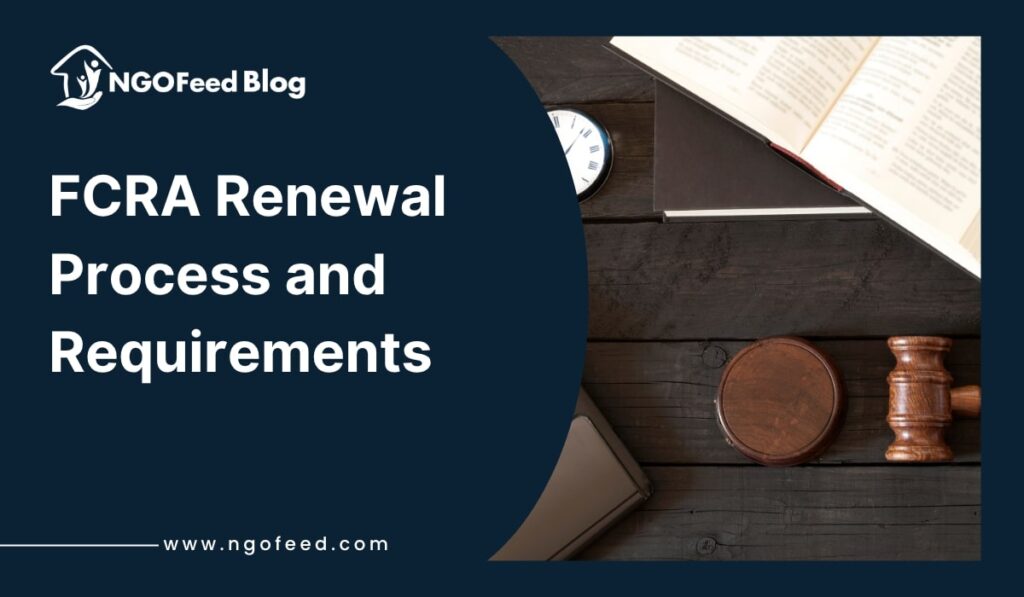FCRA Renewal Process and Requirements: A crucial law passed by the Indian government to control the acceptance, use, and handling of foreign contributions is the Foreign Contribution (Regulation) Act (FCRA), 2010. Overseas money from people, groups, and non-government organizations (NGOs). Its main goal is to guarantee that foreign gifts do not compromise national security, sovereignty, or public interest while encouraging openness and accountability in the nonprofit industry.
Every five years, an NGO granted FCRA registration must renew its permission in order to keep obtaining foreign funding. Under the purview of the Ministry of Home Affairs (MHA), the renewal process calls for a thorough examination of the records, governance structure, and legal compliance of the company.
Given India’s stricter regulatory environment, NGOs must keep donor trust, run programs, and show financial integrity by means of prompt and precise FCRA renewal.
Table of Contents
1. FCRA renewal objectives
Several objectives are served by the rebirth process:
- To help to guarantee the continuing eligibility of the group to get international funding.
- To determines whether the NGO’s actions agree with its professed goals and national interest.
- To ensure the openness and appropriate usage of funds previously received.
- To good government and accountability among voluntary groups.
Also Read: Government Grants vs Corporate CSR Funding
2. Frequency and Applicability
- Registered under FCRA, every NGO, trust, society, or Section 8 business must renew.
- Frequency: Every five years starting from the date of initial registration or last renewal.
- Applications should be submitted at least six months prior to the expiry date to prevent suspension or cancellation.
3. Significant Legal Regulations
The renewal mechanism is ruled by:
- Renewal of registration under Section 16 of the FCRA, 2010.
- Rule 12 of the FCRA Rules, 2011 (as amended in 2022) sets out form and timeframes for application.
- Introduced major changes including the requirement for a foreign funds SBI Delhi Main Branch account under the FCRA Amendment Act, 2020.
4. Online Application Procedure (Step-by-Step Guide)
The FCRA Online Services Portal guides the whole procedure: https://fcraonline.nic.in
- Step 1: Using current FCRA credentials, log into the portal.
- Step 2: Choose Form FC-3C, “Application for Registration Renewal,” second step.
- Step 3: Provide bank information, PAN, address, DARPAN ID (if available), and FCRA number.
- Step 4: Update executive committee members’ information, including nationality, PAN, and Aadhaar.
- Step 5: Upload scanned copies of needed documents (PDF format).
- Step six: Using internet mode, pay the renewal charge of ₹1,500.
- Step 7: Submit the application only after a thorough review of every entry.
- Step 8: Keep the Acknowledgement Number for later tracking.
5. Documentation Necessary
Quick approval calls for a thorough and precise documentation system. These papers are required:
- Self-attested copy of the FCRA registration certificate now in use.
- Registration certificate copy (Trust Deed, Society Registration, or Incorporation).
- Organizational PAN card
- income, expenses, and balance sheets for the last three fiscal years; audited financial records.
- Forms FC-4, FCRA Annual Returns for the prior three years.
- Particulars of the principal functionaries with verification of identification and address.
- Declaration that the organization is not engaged in any banned activities under FCRA (anti-national, religious conversion, etc.).
- Details for designated SBI Bank Account, Delhi Main Branch.
- If appropriate, information on utilization.
- Chief functionary’s signature and photograph.
Also Read: How to Attract Foreign Donors to NGO
6. Requirements for Renewal
An NGO may only qualify for renewal if it:
- Has not broken FCRA or other legislative requirements.
- Regularly has been filing yearly forms FC-4.
- Has kept a distinct foreign funds bank account.
- Has applied foreign donations only to the permitted objectives.
- Not engaged in anti-national or political action.
- Has not been blacklisted or debarred by any government agency.
7. Approval and Investigative Procedure
Post submittal:
- Through intelligence and local administrative records, the MHA performs a thorough background check.
- Field agencies could be asked to evaluate the NGO’s activities and financial use.
- The renewal certificate is delivered electronically if all documents are deemed acceptable.
- Should there be inconsistencies or negative comments, the MHA might issue a show-cause notice prior to rejecting the renewal.
8. Process Schedule
Though the process length may differ, NGOs usually get their updated certification in three to six months. Incomplete paperwork, pending compliance, or verification reports could cause delays.
9. Causes for Suspension or Rejection
Renewal can be refused, suspended, or cancelled under the next circumstances:
- Years of non-filing of annual returns successively.
- Misdirection or misappropriation of foreign monies.
- Active participation in events against the public or national good.
- Submitted false or erroneous data in the application.
- Organization sleeping or dead for more than two years.
- Should rejected, the company can appeal under Section 32 of the FCRA within 60 days.
10. Post-Renewal Obligations
Once restored, NGOs should:
- Post the FCRA certificate, registration number, and important information on their official website.
- Annual Returns: File Form FC-4 by December 31st each year.
- Within 15 days of any bank account, office address, or governing body change (Form FC-6 series), notify MHA.
- For inspection, keep open accounting systems and records.
Also Read: How to Apply for Government Grants for NGO
11. Common difficulties NGOs meet number
- Technical problems: login issues or repeated site outages.
- Documentation inaccuracies: Differences between registration, FCRA records, and PAN data.
- Challenges in opening or maintaining the assigned SBI Delhi account cause banking delays.
- Lack of current MHA status updates.
- Restricted Legal Knowledge: Many minor NGOs lack qualified staff members for compliance.
- Stricter Monitoring: More legislative control following post-2020 changes.
12. Advice for Effective Renewal
- Begin planning 8 to 10 months before expiration.
- Carry out a yearly inside compliance audit.
- Maintain properly labeled digital copies of all papers.
- Hire or seek legal professional or compliance expert advice.
- Get notifications from MHA and alterations in FCRA Rules on regular basis.
- Check often that the NGO’s actions match its altruistic goals.
13. Consequences for Failing to Renew
Failure to renew FCRA registration carries rather severe repercussions:
- Automatic termination of registration.
- Inability to access or use outside cash.
- The NGO might have to apply for new registration, therefore undergoing a more sophisticated process.
- Only with MHA’s consent can the remaining foreign contributions in the account be transferred or destroyed.
- Possibly authorities will blacklist someone or look into.
14. Advantages of Quick Renewal
- Makes sure operations and financing are consistent.
- Establishes credibility and trust among sponsors and partners.
- Shows robust institutional management.
- Avoids suspension and legal fines.
- Supports the company in confidently planning long-term projects.
15. Future Changes and Digitalization
- Through the MHA is slowly upgrading the FCRA framework.
- Automation of validations and improved digital compliance solutions.
- Compatibility with the NGO-DARPAN portal for openness.
- Real-time monitoring of programs.
Also Read: FCRA Rules 2025: What Every NGO in India Must Know
Conclusion
Maintaining the integrity, responsibility, and transparency of India’s nonprofit sector depends much on the renewal process of the FCRA. For NGOs, it is not merely a legal need but also a reaffirmation of their ethical dedication to public service and responsible use of foreign funds.
NGOs can guarantee a smooth renewal, ongoing support from foreign funders, and sustained participation in the social development of India by keeping prompt compliance, thorough documentation, and honest financial records.
Frequently Asked Questions (FAQs)
1. What is the validity period of FCRA registration?
Five years from the date of grant or last renewal.
2. What if the renewal application is delayed?
If not filed within the prescribed time, the registration ceases to exist, and the NGO must apply afresh.
3. Is physical submission required?
No, the process is completely online via the MHA FCRA portal.
4. How much is the renewal fee?
₹1,500 (may vary depending on future notifications).
5. Can an organization operate without FCRA renewal?
No. It cannot legally receive or use foreign funds.









